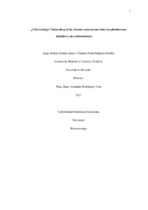| dc.contributor.advisor | Rodriguez Vera, Hugo Armando | |
| dc.contributor.author | Gomez Jerez, Angy Meliza | |
| dc.contributor.author | Meneses Beleño, Tatiana Paola | |
| dc.coverage.spatial | Colombia | spa |
| dc.date.accessioned | 2023-09-01T21:10:57Z | |
| dc.date.available | 2023-09-01T21:10:57Z | |
| dc.date.issued | 2023 | |
| dc.identifier.other | Trabajo de Grado | |
| dc.identifier.uri | http://hdl.handle.net/20.500.11912/11051 | |
| dc.description | 50 páginas | spa |
| dc.description.abstract | La era digital ha traído consigo nuevas relaciones jurídicas que surgen a través de redes tecnológicas, y la
generación de ingresos vía internet es muy común hoy día. El problema surge cuando dicha relación se desliga
de la responsabilidad ante los intermediarios que facilitan el funcionamiento del comercio electrónico. Los
servidores de la sociedad de la información muchas veces dejan sin protección a los colaboradores de las
diferentes aplicaciones y redes, por lo que la naturaleza de la relación jurídica que surge entre ellos no es clara.
Por esta razón el presente escrito buscó descifrar qué elementos jurídicos acompañan las relaciones que surgen
por medio del comercio electrónico y de los servidores de la sociedad de la información para identificar la
naturaleza de las vinculaciones de la cuarta revolución industrial. Se concluyó que, dependiendo de cada
escenario, puede existir una relación de naturaleza laboral o, algunas veces, meramente comercial, sin dejar de
lado la regulación para estos nuevos escenarios. | spa |
| dc.description.abstract | The digital era has brought new legal relationships with it, which arise through technological networks; and the
income generation via internet is very common today. The problem arises when this relation is separated from
the responsibility around the intermediaries that facilitate the operation of electronic commerce. The information
society servers often leave unprotected the collaborators of the different applications and networks, which is why
the nature of the legal relationship that arises is not clear. For this reason, the present writing aimed to identify
the legal elements that run the relations between electronic commerce and the servers of the information society,
in order to recognize the legal nature of the fourth industrial revolution bonds. Therefore, it was concluded that,
depending on each scenario, there might exist a relationship of a labor nature, or sometimes merely commercial,
without forgetting that these new scenarios must be regulated. | en |
| dc.format.mimetype | application/pdf | spa |
| dc.language.iso | spa | spa |
| dc.rights | Attribution-NonCommercial-NoDerivatives 4.0 Internacional | * |
| dc.rights.uri | http://creativecommons.org/licenses/by-nc-nd/4.0/ | * |
| dc.subject | Comercio electrónico | spa |
| dc.subject | Economía colaborativa | spa |
| dc.subject | Derecho laboral | spa |
| dc.subject | Aplicaciones | spa |
| dc.title | ¿Cibertrabajo? Naturaleza de la relación contractual entre las plataformas digitales y sus colaboradores | spa |
| dc.type | Trabajo de Grado | spa |
| dc.publisher.department | Escuela de Derecho y Ciencias Políticas | spa |
| dc.publisher.program | Derecho | spa |
| dc.type.hasVersion | draft | spa |
| dc.description.sectional | Bucaramanga | spa |
| dc.relation.projectID | Cibertrabajo_relación contractual_plataformas digitales_colaboradores | spa |
| dc.description.degreename | Abogado (a) | spa |


